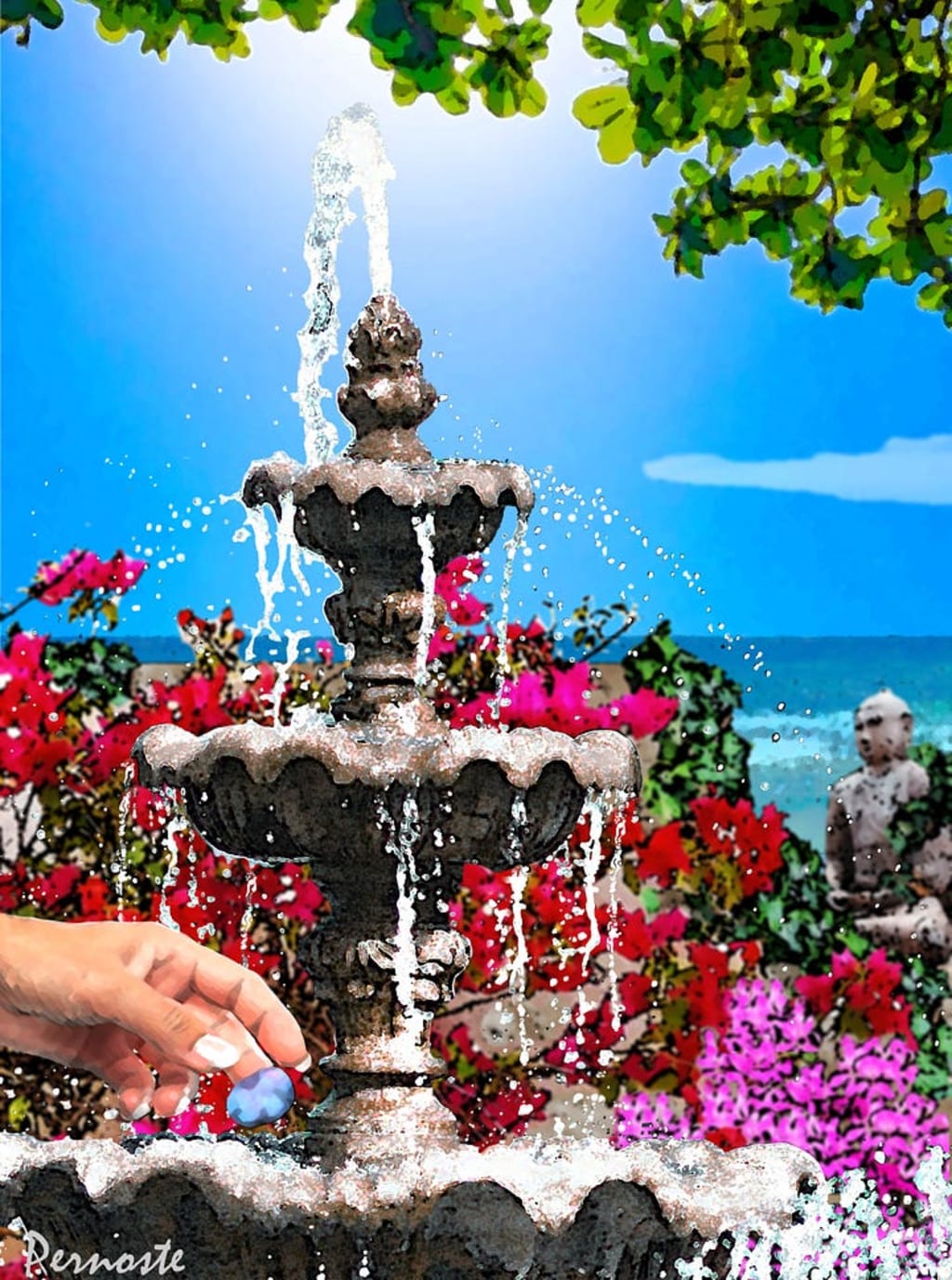
I am drawn to the sound of water. I always have been. It makes me joyful and peaceful. Through that, it brings me happiness. That's why I often go to the sea to just listen to the sound of the waves and become rejuvenated and enlightened by this immense, vast, and wonderful gift of positive energy.
"These slow, whooshing noises are the sounds of non-threats, which is why they work to calm people," says Orfeu Buxton, an associate professor of biobehavioral health at Pennsylvania State University. "It's like they're saying: don't worry, don't worry, don't worry."
"Learn this from water: loud splashes the brook but the oceans depth are calm." - Siddhārtha Gautama
I am drawn to flowers. I always have been. I make it a point to wake up early in the morning to observe their growth whenever I can and can hardly wait for their time to bloom and open with the sunlight.
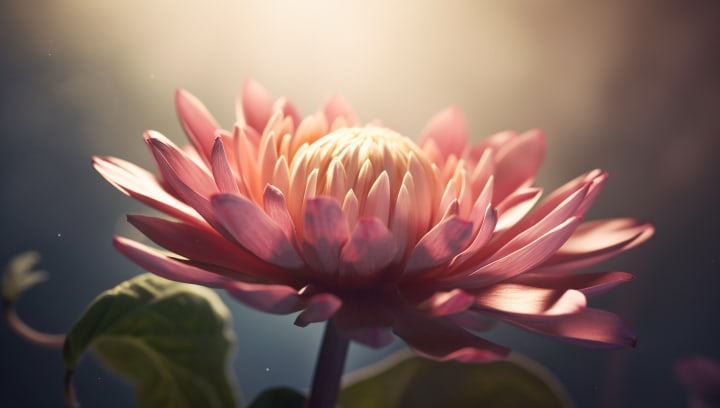
To me, they represent the archetype at the heart of creation. Delicately made in heaven, flowers are a beautiful reminder of life's potential. The Bible often uses them as a symbol of beauty and growth, and some are so enchanting that they make you smile, filling you with joy and gratitude for this gift.
"When you realize how perfect everything is you will tilt your head back and laugh at the sky."- Buddha
So I've created my own 'Garden of Eden' in our backyard. A little oasis where every flower is a dazzling display arranged around the petite fountain that bubbles with life. When the sun's rays dance across the sparkling water droplets, a miniature rainbow comes to life, casting a spell of wonder and enchantment over my heart.
At least that is how it appears in my mind the moment I step into this image, taking in the surroundings and the sounds of the burbling fountain. I just cannot help but smile and feel happy.
"We are shaped by our thoughts; we become what we think. When the mind is pure, joy follows like a shadow that never leaves." - Buddha
While listening to the sound of the water, a parable about water from Rumi in the Masnavi came to my mind.
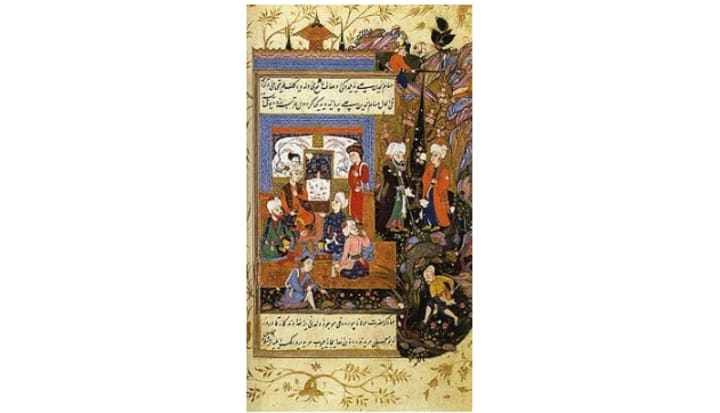
The Masnavi, or Masnavi-ye-Ma'navi (Persian: مثنوی معنوی), the title meaning 'The Spiritual Couplets', is an extensive poem written in Persian by Jalal al-Din Muhammad Balkhi, also known as Rumi, a poetic collection of anecdotes and stories derived from the Quran, from hadith sources, and everyday tales. It clarifies the various dimensions of spiritual life and practice to Sufi disciples and anyone who wishes to ponder the meaning of life.
'The Thirsty Man, the Wall, and the Water' or: 'The story of the Clay Brick'
"Upon a high adobe wall on the river's edge sat a man dying of thirst. If a fish out of water thrashes about in an attempt to reunite with the water, the man too was struggling to reach the water. However, the wall was steep and try as he might, he could not access the water.
He fixed his eyes on the clay bricks that comprised the wall he sat upon. They were moist and well torn. After struggling for a while, he succeeded in freeing one of the bricks. He took it and threw it into the water. The noise that came back to his ears sounded like water flowing from a spring. It was as intoxicating as the sweet voice of a loved one.
He yanked out another brick and tossed it into the water. He listened with joy to the sound it made splashing into the water. He took out another brick. And then another and another. He picked up speed as his enthusiasm carried him away. 'What do you think you will achieve by throwing bricks at me?', asked the water.
'I have two advantages in doing this,' called the man to the water. 'The first is that I will slake the thirst of my parched heart. Your sound resembles the sweet voice of the angel, Israfil, whose voice restores live to whoever hears it. Your sound is like the thunderclap heard by plants, grass and flowers on hot summer days, heralding the coming rain. The other advantage is that every brick I take out and throw in brings me closer to you, oh running water."
- excerpt from the book Rumi Therapy by Nevzat Tarhan
In this parable, Rumi refers to the Spirit who loves nothing more than breaking down the wall of outer senses. In Sufi philosophy, the world is constantly perishing and brought back to life through iterative experiences: dying to self - fana, 'to die before one dies', and resurrection in the Spirit - baqaa.
This path involves three degrees, each one referring to a particular aspect of the divine theophanies, a visible manifestation of a deity or a Divine manifestation, as the principle of existence and its qualitative evolution, consisting of faith, knowledge, and grace.
Now, what does this parable have to do with Buddha and happiness? I'll try to illustrate that in this little poem:
"Love the burbling of the invisible waters,
break the stones of the walls that withhold your spirit,
throw them into the unseen flowing rivers,
a joyful resonate, to loveless people merely a splash."
- Sofie
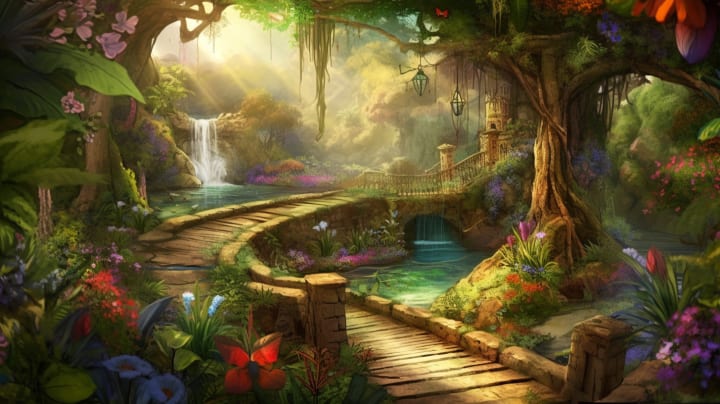
Path to Enlightenment
Little is known about the life of Buddha.
It is believed that he was born as Prince Siddhartha Gautama in 500 to 600 BC in Nepal. In his twenties, Siddhartha experienced realities of the outside world that led him on a quest for enlightenment. He left the palace of his father to search for it and eventually attained enlightenment.
It was then that he became Buddha.
"In the end these things matter most: How well did you love? How fully did you live? How deeply did you let go?"- Buddha
Suffering
A lot of emphasis in Buddhist teachings is aimed at ending suffering. Suffering in Buddhist philosophy includes all sorts of forms of unhappiness. Like worries, depression, anger, and regrets.
Anything, no matter how subtle, that prevents you from living a happy and fulfilled life. And prevents you from ultimately reaching a state of enlightenment.
I've always understood from Buddha's teachings that the root of suffering and worrying is attachment.
"You only lose what you cling to."- Buddha
But the Dalai Lama mentioned something that struck me at a deep level, and has continued to resonate with me: 'suffering is caused by ignorance'.
The traditional teaching that attachment (in whatever form) is the root cause of suffering is true. However, the statement that suffering, and therefore worrying, is caused by ignorance, took those teachings a step further and into a new context for me.
Shantideva - a famous 8th-century Buddhist teacher - says in his most famous work 'the path of the bodhisattva':
"Although we have a mind that wants our suffering to subside, we rush ourselves directly to suffering. Although we strive for happiness, we destroy through our ignorance our happiness, as if it were an enemy."
For it is not only attachment that worries us but also the fact that people continue to be attracted to the things that cause suffering.
For example, you may know that worrying thoughts cause you to suffer and keep you from happiness, but you still keep replaying those thoughts in your head, even though this peaking doesn't change anything that happened in the past and will most likely not happen in the future.
"The greatest impurity is ignorance. Free yourself from it. Be pure." - Buddha
You may know that a certain friendship is toxic for you, but you still give that friendship another chance in the hope that it will change for the better.
You may know that certain foods, drinks, or drugs, are not good for you, will cause you to suffer, and won't lead to happiness, but you still keep on consuming them.
The fact that we decide to ignore these things, leads to suffering. And it is because of our ignorance that we worry about things.
"Understand the suffering of worldly existence.
Abandon its causes of ignorance and selfishness.
Practice the path of meditation and compassion.
Awaken from suffering within Great Peace." - Buddha
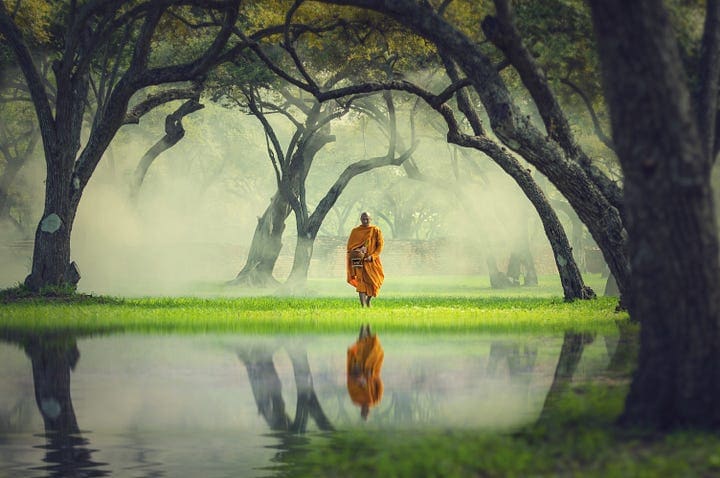
Happiness through Suffering
In Buddhism, pain is regarded as imminent, but suffering is optional. Because of the pain in your heart communication is possible. And through that communication, you can find happiness.
This may sound vague at first. Why should you be in pain to be happy? The Buddha sees it this way: your suffering and the suffering of many others are the basic conditions to allow the Buddha into our hearts.
Suffering is so important in Buddhistic teachings because you have to learn to understand it in order to feel happiness. Buddhism teaches us to not run away from our pain but to study and reflect upon our suffering.
We need to be able to call our suffering by its specific name and identify all of its characteristics. Only this will bring us happiness and joy 'without setbacks'.
After that, it is a matter of finding the kinds of nourishment that have helped it come to be and that continue to feed it.
Buddha has identified four kinds of nutriments that can lead to our happiness or our suffering: edible food, sense impressions, intention, and consciousness. (see page 31 in 'The Heart of the Buddha's Teaching: Transforming Suffering into Peace, Joy, and Liberation' by Thich Nhat Hanh)
"On life's journey faith is nourishment, virtuous deeds are a shelter, wisdom is the light by day and right mindfulness is the protection by night. If a man lives a pure life, nothing can destroy him." - Buddha
When it comes to happiness, Buddha is rather clear: 'it doesn't depend on what you have or who you are. It solely relies on what you think.' In other words, 'it involves a disciplined mind to bring happiness.' As stated by Buddha 'it is ridiculous to think that somebody else or the material world can make you happy or unhappy. Happiness will never come to those who fail to appreciate what they already have.''
"There is no path to happiness. Happiness is the path. You cannot travel the path until you have become the path itself." - Buddha
Which to me sounds like a hopeful concept, because it means you can train your mind and yourself in happiness. It also means that status and wealth won't make you happy but are just obstacles to your happiness.
For our happiness, we need to develop the desire to live without these things so that we can enjoy all the wonders of life that are always available. In case you find that difficult, Buddha hasn't always been happy himself.
"Have compassion for all beings, rich and poor alike; each has their suffering. Some suffer too much, others too little." - Buddha
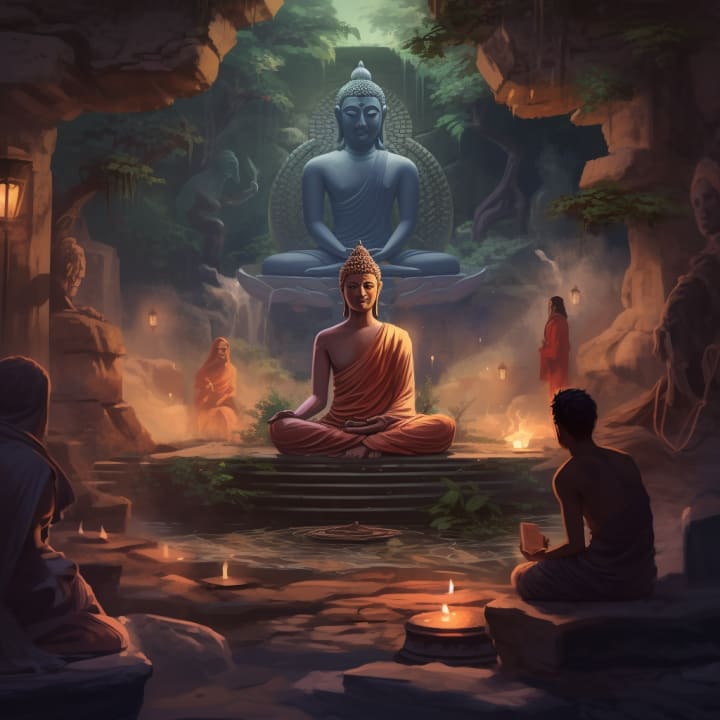
The Story of Siddhartha - how he became a Buddha
There is this beautiful novel written by Hermann Hesse, that influenced many lives including mine, narrating the story of a young boy, called 'Siddhartha', the journey how he became a Buddha. Whether it reaches a real truth beyond this or not, this book makes us aware that we all struggle, either in our minds or our professional life or calling, and, by our nature, although we all yearn for answers, are unable to grasp the truth of WHY.
Asking why, why we are here, why we bother, is a painful question usually not leading to satisfactory answers when it comes to the mysteries of life. So far, the answers to life's mysteries have been beyond our reach, and even Buddhism, the acknowledging of suffering, or the deepest meditation, does not offer real respite from either suffering or uncertainty.
'Siddhartha' is an acknowledgment of this limitation, combined with the joy for life that we should still strive for while embracing our suffering. In the end, we are all looking for happiness which is actually inside us hiding in a deep shell for you to dig out.
In this novel, Siddhartha lives with his father in a village in ancient India. Everyone expects Siddhartha to become the successor of his father, a Brahmin. Together with his best friend, Govinda, Siddhartha enjoys a near-idyllic existence. Yes, he practices what religion claims to bring him inner peace and happiness, and he immerses himself in the teaching of the wisest. But in his heart, he is secretly dissatisfied and unhappy with the falseness of society and life as we are generally taught to see or live it.
So, one day he decides to take fate into his own hands. Accompanied by his rules-following friend Govinda, he takes on the life of a wandering monk-like beggar by joining a group of almost naked and starving wandering ascetics called Samanas. He quickly adapts to their ways and learns how to free himself from his desires, except that required to live, trying to find enlightenment by eliminating his Self, the ego. Yet, since even the oldest Samanas - like the Brahmins - have also not been successful in attaining true spiritual enlightenment, this path of self-denial does not provide him with a permanent solution.
Then, rumor goes that there is a new guru named Gotama the Buddha who has attained the total spiritual enlightenment called Nirvana, and Govinda convinces Siddhartha to seek him out. Siddhartha gets instructed in the Eightfold Path and is initially hopeful, but Siddhartha notices a contradiction in Gotama's teachings. He struggles with embracing the unity of all things in regard to overcoming the physical world. So Siddhartha decides to leave Govinda and the Buddhistic teachings behind to go on a quest to find his own meaning of life, not dependent on religious instruction.
He then engages himself in a life filled with the bodily pleasures of the material world. While crossing a river to the city, he encounters a friendly ferryman, fully content with his simple life. After arriving in the city, Siddhartha meets the beautiful courtesan Kamala, who will, later on, become his wife and the mother of his son, who teaches him all she knows about love and convinces him to take up the path of the merchant to prove his worth to her, that he can fit into the material world.
Years pass, and Siddhartha becomes a successful and rich businessman, gambling, drinking, dancing, and enjoying the benefits of an affluent life. However, the richer he becomes, the least satisfied. Siddhartha feels detached from his life that doesn't touch or fulfill his spirit in any lasting way, and he can never see it as more than a game. When he is at his most disillusioned, he again resolves to leave this life behind, leaving without notifying anyone.
Heavy at heart he considers drowning himself in a river. Instead, he falls asleep alongside the riverbank and during his sleep, Govinda, who is now a Buddhist monk, passes by. Govinda watches over the sleeping Siddhartha to protect him from snakebites. Govinda doesn't recognize Siddhartha, only seeing what appears to him as a rich man. Siddhartha, however, after waking up, immediately recognizes Govinda, explaining to Govinda that he is not a rich man, nor a Samana, but on a quest to become someone new. They separate and both continue on their own journey.
Siddhartha then looks up Vasudeva, the ferryman with an inner peace he met years before, and expresses to him his desire to likewise attain that inner peace through learning from the river. Now working for Vasudeva, he contemplates the unity of all life while sitting, listening to, and staring into the river. In the burbling sounds of the river, he starts hearing the word OM. It is then when Siddhartha begins to experience spiritual enlightenment from the river unlike any he has ever known.
One day his wife Kamala approaches the ferry along with her son on a pilgrimage to visit Gotama, who is said to be dying. Kamala gets bitten by a snake and before she passes away, she tells Siddhartha of his eleven-year-old son. After Kamala's passing, Siddhartha tries his best to attend to his son, but one night his son steals all the money from Siddhartha and Vasudeva running back to the city-life he grew up in and longed for. First Siddhartha wanted to follow him but understood that it is was better to let him go. For he realized that, for his happiness, his son had to walk his own path.
Siddhartha learns the many secrets the river has to tell from Vasudeva and has a revelation; Just as the water of the river flows into the ocean and is returned via clouds in the form of raindrops, all forms of life are interconnected in a continuous cycle, a timeless unity of birth and death, alpha and omega, joy and sorrow, yin and yang. All are part of the whole, necessary to understand the meaning of life.
After Vasudeva retires into the forest, Siddhartha becomes the ferryman, radiating an inner peace and happiness just by looking into the river, seeing the colorful sparkles and listening to the burbling of the river that to him sounds as the rejoice of children's laughter.
In the end, his friend Govinda, who hasn't yet attained this kind of enlightenment, comes to seek enlightenment by meeting with a wise man who is said to live by the river. Siddhartha explains to him that the entirety of enlightenment cannot be obtained by verbal communication. He does pass on the vision of unity that he has experienced by asking Govinda to kiss him on the forehead so that both Siddhartha and Govinda finally have found the enlightenment they set out to find when they started their journey together.
"Imagine that every person in the world is enlightened but you. They are all your teachers, each doing just the right things to help you." - Buddha
Happiness from Within
Now, what is the central message of this story? It shows us that enlightenment can only be obtained from within, not through the wealth of the material world and not even through the teachings of the wisest. It comes from calmness, compassion, experience, rather than avoiding things in the 'real world', but understanding and regarding all things as being of value in and of themselves.
All life matters because it matters. Compassion and the natural world we are part of are at the heart of why we are here and how we comprehend it. While the meaning of words and thoughts are often unclear and time is an illusion, the only way to happiness is to regard all creation and stages of life with wonder and to look therein for our happiness.
Attachment is necessary in this world and fear of loss is also part of the deal. We gain wisdom by accepting the pain of our feelings and love. To become enlightened, our love of the world and of being part of it and our embracing of the pain of reality are equally important.
We all want to be happy. That is what a large part of the Buddhist inspired methods and insights is about. However, pursuing that happiness is not as easy as we thought or would like. Yet we pursue it. So, what can we learn from Buddha on happiness, and what is Buddha's most important advice?
"Nothing is permanent. One moment can change a day, one day can change a life and one life can change the world." - Buddha
Focus on the Present
Life screams to be seen and heard. It wants to happen to you and to be yours.
But you are so busy worrying about the future, playing scenarios in your head, making predictions about future disasters that the future is slipping through your fingers, just like water.
If you focus on the present instead of the future, you will feel and experience things that you would otherwise not be able to or miss out on.
Worrying about the future is not necessary. Give yourself the opportunity to be present, to enjoy life in the present moment, to be grateful for what you have now, to see the beauty in it all, and to become part of the interconnectedness of all that is.
"Nothing ever exists entirely alone; everything is in relation to everything else." - Buddha
Everything is temporary. We have our own life in our hands. Life is an endless amount of time presented to us in an immense, fertile space full of possibilities and opportunities.
Don't let life go by while worrying about the future. Focus on and enjoy the present.
Although many of us are lucky that we don't need to worry about tomorrow, that doesn't mean that there will always be a tomorrow. Buddha said: 'The trouble is, you think you have time'. But there is no time to waste: the past is gone, the future is not here yet and all we have is the present.
And it suddenly occurred to me that the word 'present' also means 'gift'. The gift of the present moment, the now. Essentially the only thing we truly possess. Because the past and the future are only concepts existing in our own minds. It is in the present moment where we live, where we are happy, where we can love, where we create our future. And if we decide to use our precious moment to worry, then that is by our own choice and making.
"Every morning we are born again. What we do today is what matters most." - Buddha
Somehow I found out that things that come on your path today always come for a reason and they just make you stronger, more authentic, and wiser. And it is not about what comes on your path, but about how you deal and respond to it, the lessons you take out of it while embracing your feelings and pain in the present moment.
Feelings are just inner messages that are trying to tell you something. Based on which you can let your heart speak through accepting and letting the feelings flow through you and decide whether something is meant for you or not. Does it feel heavy on your heart, then it might not be meant for you. Does it feel light and joyful, then I encourage you to explore it. Maybe that is just the turn on your path that you need at that moment.
Do you still remember the picture at the beginning of this essay? That beautiful fountain surrounded by colorful flowers, with the blue ocean in the background and a little Buddha to the right? It pictures many things that make me joyful.
Happiness is not a constant thing. Happiness depends upon events, things around you that are constantly changing, and your feelings in regard to the change. Happiness lies in the hope that the pain we're suffering cannot last forever.
For no feeling can and will last forever. Feelings are like a passing river, sometimes wild, sometimes calm water. Joy and sorrow go hand in hand, they exist next to each other. You need the contrast, the deeper the darkness, the brighter the light. Otherwise, everything would probably just be boring grey, leading to no action or reaction at all, to no creativeness whatsoever.
It is in seeking and finding joy in the present moment, in the enjoyment and being grateful for all that is around you - even if it is just the fact that you can read essays on your laptop, tablet or smartphone, or that you can listen to wonderful music, or look at beautiful images - , in the love for creation, in the belief and hopes that things will change for the better. For they will change.
Feelings can create thoughts in your mind, positive and negative. But guess what? You are the master of your own thoughts. You can decide whether you allow a thought or reasoning to linger in your mind, or whether you just let your thoughts drift away like clouds into the infinite horizon. You can decide how much time you want to spend on joyful thoughts or thoughts that cause you pain or enlarge your suffering.
It is a matter of what you focus on. It takes a disciplined mind to be happy. If you focus on the present I'm convinced that there will be something around you, even if it appears only as a small thing to you or something that you have always taken for granted, that - regarded in a different light, from a different perspective - has the potential to bring you joy. Or am I wrong?
By being joyful, by being enchanted about all the wonders around you, and by keeping up your hopes is how you are able to walk the path of happiness.
"It is better to conquer yourself than to win a thousand battles. Then the victory is yours. It cannot be taken from you."- Buddha
Be Present. Be Happy!
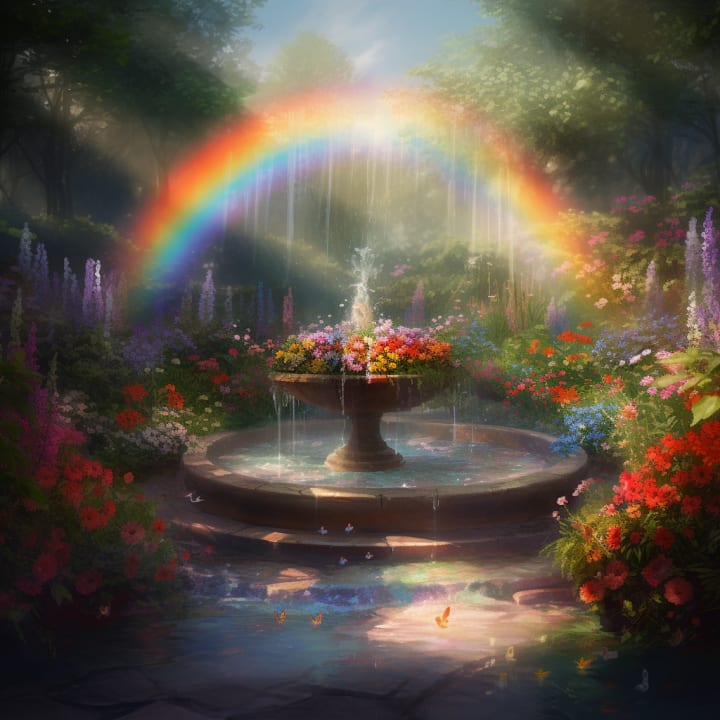
About the Creator
Sofie Weber
Sofie is a writer and composer. She loves to write short stories, poetry and to play music to her lyrics. Sometimes she creates a dreamy poetic mini movie full of heart. ✨
‘Sofie Weber’ is a pseudonym under which I publish original work.
Enjoyed the story? Support the Creator.
Subscribe for free to receive all their stories in your feed. You could also pledge your support or give them a one-off tip, letting them know you appreciate their work.


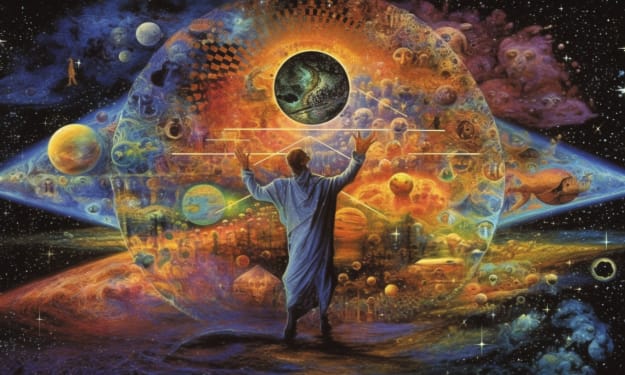

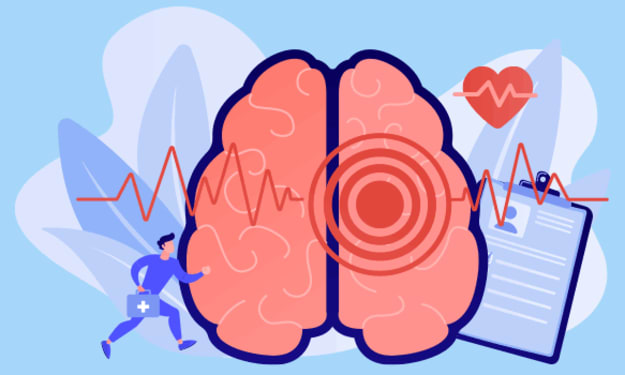

Comments (1)
Amazing and deep and profound. And inspiring!💙Anneliese